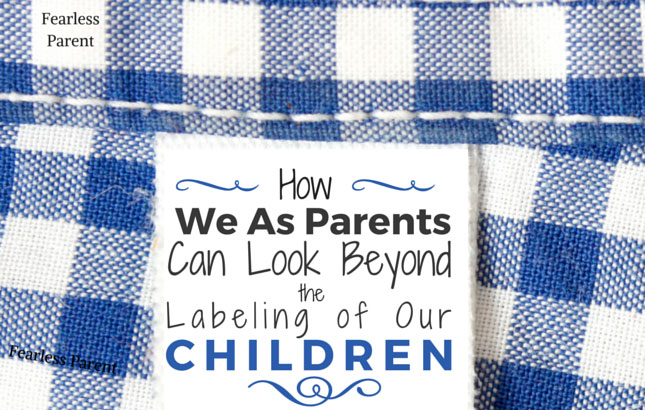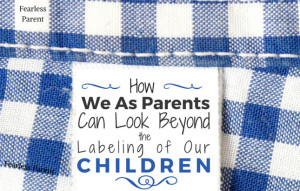Diagnosis labeling, that is
It doesn’t matter what label your child has been given. What you need to know is that a label is often harmful. It restricts, pathologizes, stigmatizes… it kills hope. If a clinician believes bowel disease is intrinsic to autism then she may tell you there’s nothing that can be done about GI pain. Doctors, like all of us, are circumscribed by their beliefs. Do you want your child’s potential for healing and recovery to be defined by the boundaries of, say ICD-9 code 314.01 (ADHD)? Can you see how your view of your son’s delays or your daughter’s emotional bandwidth can get set in concrete as you attach to the name of a disorder? Labels are only necessary for IEP meetings and insurance reimbursement. It’s time to figure out how we as parents can look beyond the labeling of our children.
Finding my way
How did I get from being a macaroni and cheese-feeding, Tylenol-pushing, pesticide-wielding mom of two boys with Sensory Processing Disorder, asthma, allergies, eczema, acid reflux, hypotonia, and developmental delays to a holistically-inclined mom with recovered sons, now aged 9 and 7?
It was a long journey. I had to question everything I believed to be true. I had to metamorphize emotionally, spiritually, and intellectually for my sons to gain health. Should it have been so difficult? No. But I couldn’t rely on the usual experts: compromised government agency bureaucrats and cookie-cutter doctors. I had to find my own way.
In the beginning, I believed whatever they said was the God’s-honest truth. I saw a conventional specialist for allergies and a standard gastroenterologist. Neither mentioned anything about food and food sensitivities. They armed me with the modern weapons of the conscientious, mainstream mother: Tylenol, Prevacid, Miralax, prednilosone, Xopenex, cortisone cream, antibiotics, and Periactin.
And yet, my kids were getting sicker. Their sensory sensitivities became worse. My older son threw up after every meal. Both had failure to thrive and developmental delays.
My big “aha!” moment came when I read Dr. Kenneth Bock’s Healing the New Childhood Epidemics: Autism, ADHD, Asthma and Allergies: The Groundbreaking Program for the 4-A Disorders. Before reading this book, I didn’t understand why my sons had SPD or what I could do about it. While reading it, I began to see that pretty much any disease has many of the same underlying dysfunctions, which I’ll review later.
I later learned that the FDA, USDA, CDC, and EPA are compromised by the influence of the corporations they were supposed to be policing. I learned about the dangers of our adulterated and heavily processed foods, I learned that using what I thought of as innocuous over-the-counter drugs like acid-reflux medications, Tylenol, ibuprofen, Miralax, and cortisone creams can have dangerous consequences.
I learned that doctors don’t have time to research peer-reviewed medical research that’s freely available on PubMed.gov and instead rely on information from pharmaceutical reps.
I learned that autism, ADHD and SPD have strikingly similar symptoms to seemingly disparate diseases as Parkinson’s, multiple sclerosis, ALS, Alzheimer’s, fibromyalgia, lupus, and even allergies, eczema, and asthma.
Underlying dysfunction
What doctors, practitioners and parents ought to focus on is the underlying dysfunction common to kids with ADD, ADHD, OCD, PDD-NOS, other ASDs, and SPD, as well as children with learning disabilities and development delays. The following six features affect every condition mentioned here and should be addressed with all developmentally-delayed children.
TOXICITY
A research study from the Mount Sinai Children’s Environmental Health Center lists the top ten chemicals and mixtures suspected of causing “developmental neurotoxicity,” that is, damage to the brain and nervous system of a fetus or child. They are:
- Lead
- Methylmercury
- Polychlorinated biphenyls
- Organophosphate pesticides
- Organochlorine pesticides
- Endocrine disruptors
- Automotive exhaust
- Polycyclic aromatic hydrocarbons
- Brominated flame retardants
- Perflourinated compounds
The groundbreaking Environmental Working Group report, Body Burden: The Pollution in Newborns, revealed that newborns carry an average load of 200 chemicals, including all ten offenders above. Mothers are unknowingly passing on their toxic load to their children. Other toxins, such as artificial colors, preservatives, glyphosate (RoundUp), and doctor-touted Tylenol also have a high correlation with autism and other neurodevelopmental disorders.
GUT DYSBIOSIS
Gut dysbiosis is an imbalance of good versus bad bacteria, yeast, viruses, parasites and pathogens. It is common in children with neurodevelopmental disorders, and is usually in the form of Candida overgrowth, Lyme infection or Clostridium infection. Because most neurotransmitters are made in the gut, a gut infection can affect brain functions such as mood, attention and behavior. Michael Gershon wrote about this in his groundbreaking book, The Second Brain: A Groundbreaking New Understanding of Nervous Disorders of the Stomach and Intestine. The most common causes of gut dysbiosis are antibiotics, maternal inheritance, and the Standard American Diet. Watch for the following symptoms: acid reflux, colic, projectile vomiting, chronic constipation/diarrhea, food sensitivities or allergies, dark under-eye circles, red cheeks or ears after eating, gas, chronic stomach aches, chronic ear infections, and chronic sinus infections.
IMMUNE DYSREGULATION
Gut dysbiosis typically leads to immune dysregulation because the GI tract houses about 70% of the immune system. Immune dysregulation is common in children with neurodevelopmental disorders, and autoimmunity is a classic example of immune dysregulation. Allergies, food sensitivities and intolerances, eczema, and asthma are typical signs of immune dysregulation.
INFLAMMATION
Chronic inflammation is a hallmark of chronic disease. Kids with neurodevelopmental and neuropsychiatric disorders typically have neuro-inflammation. The top ten toxins listed above are neurotoxic. Stress and nutritional deficiencies can add to the overload. Children with autism, ADHD, and other neuropsychiatric disorders such as bipolar disorder, schizophrenia and mood disorders typically have higher levels of inflammation.
NUTRITIONAL DEFICIENCIES
Nutritional deficiencies are typical in children with neurodevelopmental disorders. They can be passed on from the mother or caused by pharmaceuticals, gut dysbiosis, early cord clamping, modern agricultural practices, low stomach acid, and picky eating. Kids with neurodevelopmental disorders often lack sufficient magnesium; zinc; iodine; vitamin D; methylated nutrients, such vitamin B12 and folate; amino acids, such as carnitine, tryptophan; and cysteine, fatty acids, and glutathione. When these deficiencies are corrected with nutrient-dense food and supplementation, many children show marked improvement.
HORMONAL IMBALANCES
Adrenal fatigue and low thyroid function are typical of children with neurodevelopmental disorders. Raphael Kellman, MD, a pioneer in functional medicine, says 70-80% of kids with these kinds of disorders are hypothyroid. *** Instead of searching for new ways to label the current crop of alarming conditions and diseases, it makes more sense to correct these common underlying causes that they all share. This may mean that prescription medications won’t be necessary and children will feel better. Shouldn’t this be the basis of medicine?
 Want more info? Win a copy of my book!
Want more info? Win a copy of my book!
I wrote about these six underlying dysfunctions in my new book, Almost Autism: Recovering Children from Sensory Processing Disorder, A Reference for Parents and Practitioners (2014). We have six easy ways for you to win a copy. Click here for details
 Maria Rickert Hong is a Certified Holistic Health Counselor. She helps parents make diet and lifestyle changes to help children with the symptoms of Sensory Processing Disorder, ADHD, “almost autism,” and autism spectrum disorders. Maria recovered her two boys from SPD, asthma, acid reflux, and eczema. She is a board member, Media Director, and blogger for Epidemic Answers. Maria is a former Wall Street equity analyst. For more information, go to MariaRickertHong.com.
Maria Rickert Hong is a Certified Holistic Health Counselor. She helps parents make diet and lifestyle changes to help children with the symptoms of Sensory Processing Disorder, ADHD, “almost autism,” and autism spectrum disorders. Maria recovered her two boys from SPD, asthma, acid reflux, and eczema. She is a board member, Media Director, and blogger for Epidemic Answers. Maria is a former Wall Street equity analyst. For more information, go to MariaRickertHong.com.













January 19, 2015 2:13 pm
Comments 0